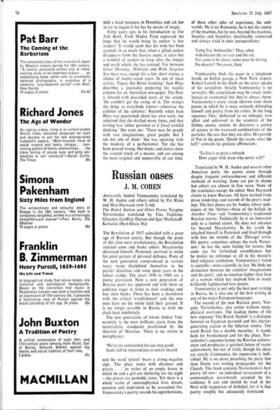Russian oases
J. M. COHEN
Antiworlds Andrei Voznesensky translated by W. H. Auden and others edited by Pat Blake and Max Hayward (our 7s 6d) The Bratsk Station and Other Poems Yevgeny Yevtushenko translated by Tina Tupikina- Glaesner, Geoffrey Dutton and Igor Mezhakoff- Koriakin (Hart-Davis 36s) The Revolution of 1917 coincided with a great age of Russian poetry. But though the poets of this time were revolutionary, the Revolution rejected some and broke others. Mayakovsky destroyed himself, Pasternak survived to make his great gesture of personal defiance. Poets of the next generation compromised in various ways; many disciplined themselves to the parties' directives and some spent years in the labour camps. The years 1930 to 1960 are a poetic graveyard. Now a new generation of Russian poets has appeared and with them an audience eager to listen to their readings and buy their books. There has been a showdown with the critical 'establishment' and the new men have on the whole held their ground. It is no longer possible in Russia to hold the clock back indefinitely.
The new generation, of whom Andrei Voz- nesensky is the most brilliant, starts from the materialistic standpoint proclaimed by the theorists of Marxism. There is no return to metaphysics:
'We're too sentimental for our own good; Souls will be removed just as tonsils should.'
and the word 'priests' bears a .trong negative sign. 'The place rocks with chromos and priests . . .' he writes of an empty house in which he and a girl are sheltering for the night —the priests are probably icons. Yet there is a whole realm of unmetaphysical love, dream, emotion and inspiration to be accounted for. Voznesensky's poetry records his apprehensions,
of these other sides of experience, the anti- worlds. He is no Romantic; he is not the enemy of the machine, but he sees, beyond the machine, beauties and banalities inextricably connected and always vivid in, their juxtapositions: 'Long live Antiworlds! They rebut with dreams the rat race and the rut. For some to be clever, some must be boring. No deserts? No oases, then.'
Voznesensky finds his oases in a telephone booth, an Italian garage, a New York airport. Robert Lowell in the blurb on the cover speaks of his surrealism. Strictly Voznesensky is no surrealist. His associations may be visual, intel- lectual or assonantial but they're always sharp. Voznesensky's crazy vision informs even those poems in which he is most seriously defending himself and poetry from his critics. In the long sequence `Oza,' dedicated to an unhappy love affair and addressed to the scientists of the Dubna atomic station, he discovers a poetry of science in the wayward combinations of the particles. He sees that they are alive. His parody of Poe in the poem, 'Quoth the raven, what the hell!' contains his greatest affirmation :
'To live is so great a miracle How argue with those who never will?'
Translated by W. H. Auden and several other American poets, the poems come through despite frequent awkwardnesses and different methods of working. Some are put in rhyme but others are almost in free verse. None of the translators except the editor Max Hayward claims to know Russian. All have worked from prose renderings and records of the poet's read- ings. The best pieces are by Auden, whose tech- niques of the 'thirties—those of the ballads in Another Time—suit Voznesensky's traditional Russian metres. Technically he is an innovator only to a limited extent. He does not advance far beyond Mayakovsky. In his youth he attached himself to Pasternak and lived through with him the months of the `Zhivago' crisis. His poetry sometimes echoes the early Paster- nak: he has the same feeling for nature, the same eye for farfetched resemblances but he makes no reference at all to his master's final religious symbolism. Voznesensky's vision is scientific—meta-scientific in fact. He finds no distinction between the scientists' imaginations and the poets', and no emotion higher than love of a woman which has inspired him to many brilliantly lighthearted love poems.
Voznesensky is not only the best poet writing in Russia, he is also one of the best writing in any of the major European languages.
The second of the new Russian poets, Yev- geny Yevtushenko, also writes without meta- physical overtones. The leading theme of his new sequence The Bratsk Station' is a dialogue between an Egyptian pyramid and this electro- generating station in the Siberian tundra. The word Bratsk has a double meaning: it stands both for brotherhood and for The place. Yev- tushenko's sequence hymns the Russian achieve- ment and prophesies a spiritual future of vaster achievement, but not of faith; though his ideas are strictly Communist, his expression is indi- vidual. He is no more preaching the party line than Dante was writing propaganda for the Church. This book contains Yevtushenko's best poetry till now: an individual restatement of a commonplace passionately accepted by his audience. It can and should be read in the West with suspension of disbelief, for it is fine poetry roughly but adequately translated.






























 Previous page
Previous page